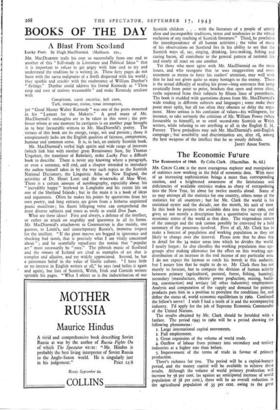BOOKS OF THE DAY
A Blast From Scotland
Lucky Poet. By Hugh MacDiarmid. (Methuen. ais.)
MR. MACDIARMID trails his coat so successfully from one end to another of this " Self-study in Literature and Political Ideas " that it is important to refuse to get angry with him and to try and understand the tradition he is writing in. These fiery pages do not burn with the saeva 'indignatio of a Swift disgusted with his world ; they sparkle and crackle with the exuberance of William Dunbar's " flytings." Dunbar could address his friend Kennedy as "Thou crop and root of traitors treasonable " and make Kennedy retaliate with
Conspirator, cursit cocatrice, hell crow, Turk, trompour, traitor, tyran intemperate, yet " Good Master Walter Kennedy " was one of the poets mourned in his " Lament for the Makaris." A good many of Mr. MacDiarmid's onslaughts are to be taken in this sense ; the pro- fessor whom at one moment he castigates is on another page brought in to bear favourable witness to Mr. MacDiarmrd's poetry. The virtues of this book are its energy, range, wit and passion ; those it conspicuously lacks are the English qualities of fairness, compromise, humour and common sense. It is, in fact, an entirely Scottish book.
Mr. MacDiarmid's verbal high spirits and wide range of interests (which link him with another great Renaissance Scot, Sir Thomas Urquhart, the translator of Rabelais), make Lucky Poet a difficult book to describe. There is never any knowing where a paragraph, or even a sentence, will end, and a chapter intended to introduce the author himself takes in by the way such topics as the Scottish National Dictionary, the Linguistic Atlas of New England, the activities of Dr. Henri Leon and the wisecracks of Mae West. There is a certain amount of autobiography, especially about his " incredibly happy " boyhood in Langholm and his recent life on one of the Shetland Islands ; but in the main it is a book of ideas and arguments. Often he makes his points by quotations from his own poetry, and long extracts are given from a hitherto unprinted poetic manifesto ; his fluent lolloping verse can comprehend the most diverse subjects. and tones as easily as could Don Nan.
What are these ideas? First and always, a defence of the intellect, or rather an attack on stupidity and ignorance in all its forms. Mr. MacDiarmid's attachment to Communism is due mainly, one guesses, to Lenin's, and contemporary Russia's, immense respect for the intellect. " If the great mams are bogged in ignorance and shocking bad taste's, that is precisely what I am vitally concerned about " ; and he scornfully repudiates the notion that " popular art " must necessarily be " easy." The pibroch music of Scotland and the rimurs of Iceland are cited as examples of art that is complex and allusive, and yet widely appreciated. Second, he has a passionate belief in the value of Gaelic culture. " I have little or no interest in English writers at all," he says (and belies it again and again), but lists of Scottish, Welsh, Irish and Cornish writers sprinkle his pages. -**‘ What I object to is the indoctrination of our
Scottish children . . . with the literature of a people of utterly alien and incompatible traditions, tastes and tendencies to the virtual exclusion of any teaching of Scottish literature." Third, he proclaims the interdependence of all human activities ; the value of many of his observations on Scotland lies in his ability to see that the Scottish ways of, say, singing, drinking, love-making, fishing and curing bacon, all contribute to- the general pattern of national life and nearly all react on one another.
Yet those who most agree with Mr. MacDiarmid on the main issues, and who recognise that he uses exaggeration and over- statement as means to force his readers' attention, may well wish that he had not given quite so many hostages to the enemy. There is the actual difficulty of reading his prose—long sentences that jump erratically from point to point, brackets that open and never close, verbs separated from their subjects by fifteen lines of parenthesis. The book is studded with quotations drawn from Mr. MacDiarmid's wide reading in different subjects and languages ; some make .their point most aptly, but all too often they obscure or delay the argu- ment. More serious is his confusion of values—his willingness, for instance, to take seriously the criticism of Mr. William Power (when favourable to himself), or to extol second-rate Scottish or Welsh writers, while refusing to see anything at all in the English E. M. Forster. These. prejudices may suit Mr. MacDiarmid's anti-English campaign ;. but' sensibility and discrimination are, after ell, among the best weapons of the intellect that he so stoutly defends.
JANET ADAM SMITH.


























 Previous page
Previous page